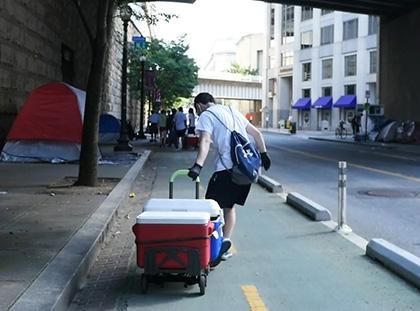
2 minute read
Love Thy Neighbor
The Gonzaga Peace Club began advocating for our homeless neighbors in early January. The pandemic made their work even more important.
In early January, members of Gonzaga’s Peace Club read an article in the Washington Post about the city’s plans to evict several dozen men and women experiencing homelessness who were living in a tent community a few blocks from Gonzaga’s campus. The group of students sprang into action, visiting and listening to the residents and trying to better understand the issues at play. The club collected 352 signatures for a petition and wrote an article for The Aquilian about the encampments.
On March 5, then-Peace Club president Henry Sullivan ’20 and club member Andrew Gans ’20 testified at a hearing of the DC Committee on Health. They presented four specific action items to the committee, including offering more housing vouchers, providing waste management, expanding mental health services, and ceasing evictions.
“This issue is complex and does not have simple answers,” said Henry Sullivan during the hearing. “One thing is for certain: These women and men living on K, L, and M Streets are not litter to be cleaned up. What we need to clean up is the injustice of homelessness.”
Just a week later, everything changed as the coronavirus pandemic ground daily life to a halt in the nation’s capital. But the Peace Club remained committed to the men and women they met living in the homeless encampments, continuing to follow their story in the news.
Eventually, they partnered with several nonprofit organizations that work in the neighborhood—including Legal Aid Clinic for the Homeless, Pathways to Housing DC, DC Mutual Aid, and People for Fairness Coalition—to begin delivering much-needed supplies every week.
In early August, the students launched a drive for supplies, asking the Gonzaga community to donate hygiene products, ready-to-eat food, bottled water, masks, wipes, travel-size toiletry kits, and first aid kits. Thirteen students offered to let their homes be used as drop-off points for donations.
As school began, the group was continuing to deliver these much-needed supplies every Sunday morning. “From the moment you step on campus as a freshman, Gonzaga students develop a unique sense of generosity and empathy that allows them to tackle moral and ethical issues within our society,” says Gonzaga Peace Club member Michael LesStrang ’22. “Seeing our homeless brothers and sisters living in tents just blocks away from the U.S. Capitol building is both deeply disturbing and heartbreaking. To combat homelessness and serve our unhoused neighbors is not just the right thing to do, it’s a way to fulfill the promise we all made to be Men for Others.”

Members of Gonzaga’s Peace Club have been delivering food and supplies to people experiencing homelessness during the pandemic.










